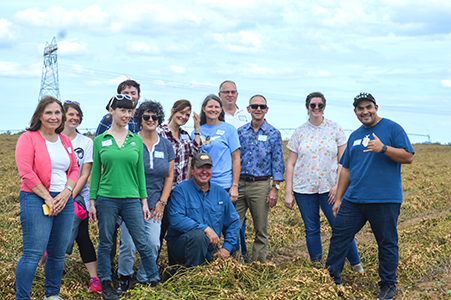Culinarians Attend Farm-To-Table Harvest Tour

Some of the nation’s top chefs, food bloggers and culinary arts instructors dug into the heart of peanut country when they attended the farm-to-table Peanut Harvest Tour in Dothan Oct. 20-23.
Sponsored by the Alabama Peanut Producers Association (APPA), Southern Peanut Growers and the National Peanut Board, the event included farm tours and stops at the Wiregrass Experiment Station in Headland, a peanut buying point, a shelling plant and Golden Boy Peanut Butter Plant in Troy.
A visit at APPA Board Member Thomas Adams’ farm in Henry County allowed the dozen participants to see peanut harvest in full swing.
“I’ve had several tours on my farm, but those tours were usually people from within the farm industry,” said Adams, who raises peanuts, cotton, hay, cattle and poultry on his farm near Newville. “This group was very interested in the equipment and entire process of planting and harvesting peanuts.”
But the tour taught more than just how peanuts are grown, said culinary arts teacher Dan Wagner of Waynesburg, Pennsylvania.
“Learning about the roots of the peanuts also gave me a symbolic connection of how the farmers are rooted in their faith and family,” he said. “It was refreshing to spend time with these farmers, share a meal with them and watch them pray before our meal to thank God for rain. It was an emotional experience.”
Likewise, Polynesian Cultural Center executive chef Felix Tai of Oahu, Hawaii, said his first trip to the South was filled with pleasant surprises.
“I’ve heard about Southern hospitality, and it’s a real thing,” Tai said. “For me, food is love. In Hawaii, we call that feeling the ‘aloha spirit.’ It’s the exact same feeling here. I could tell from talking to the farmers that they care about what they do, and they love it.
“Really, I’m just a cook, but the love I put into dishes I prepare, and the joy of knowing that people like what I cook, is what makes my job special. I think it’s the same for farmers. Being able to walk through the fields with them, share a meal and get a real look into their lives was something I could never get from reading a book. It has to be experienced to really understand it.”
Adams said the sustainability of peanuts also piqued the interest of the group, who learned that nothing goes to waste once peanuts are harvested.
“We discussed how the best peanuts are used in candy and peanut butter, while lesser-grade peanuts are crushed for high-quality cooking oil,” Adams said. “The vines are rolled up for cattle feed, and even after the peanuts are shelled, the hulls are used for poultry house bedding.”
The massive equipment, monetary investment and enormous faith farmers have wasn’t lost on Kathleen Phillips of Gardendale, Alabama, who was among the tour participants. As a food blogger, professional food stylist and cookbook author, it was her first time to share a meal with a farmer.
“My heart broke for the farmers as I listened to one of them tell how devastating this year’s drought had been to his dryland crop,” said Phillips, whose blog, Grits and Gouda, specializes in shortcut recipes. “Farmers put countless hours into these crops for months, working night and day, only to have their profits shriveled in the heat of the sun.”
But Phillips said she’s also optimistic about the future of farming.
“We met a farmer who introduced us to his 17-year-old son who was operating the large machinery equipped with GPS-guided controls,” she said. “I was encouraged for the future of peanut farming to hear this young man planned to continue his family’s tradition of farming as his occupation.”
The tour’s goal was to immerse culinarians and food bloggers in the entire peanut industry from farm-to-table in authentic Southern style, said Kaye Lynn Hataway, the APPA’s project coordinator.
“We wanted participants to spend time with family farmers digging up peanuts and learning about farming practices, today’s technology and the sustainability of peanut crops,” she said. “This tour exceeded all our expectations! It ended up being about more than the peanut industry. The attendees discovered the heart of our peanut farmers and their love for their families, farming and feeding the world.”
Attendees were asked to create recipes using peanuts, blog or write articles about their experiences and share the tour on social media.
“We want them to not only eat more peanuts but promote peanuts and spread the word about peanuts with all the people they influence,” Hataway said.
